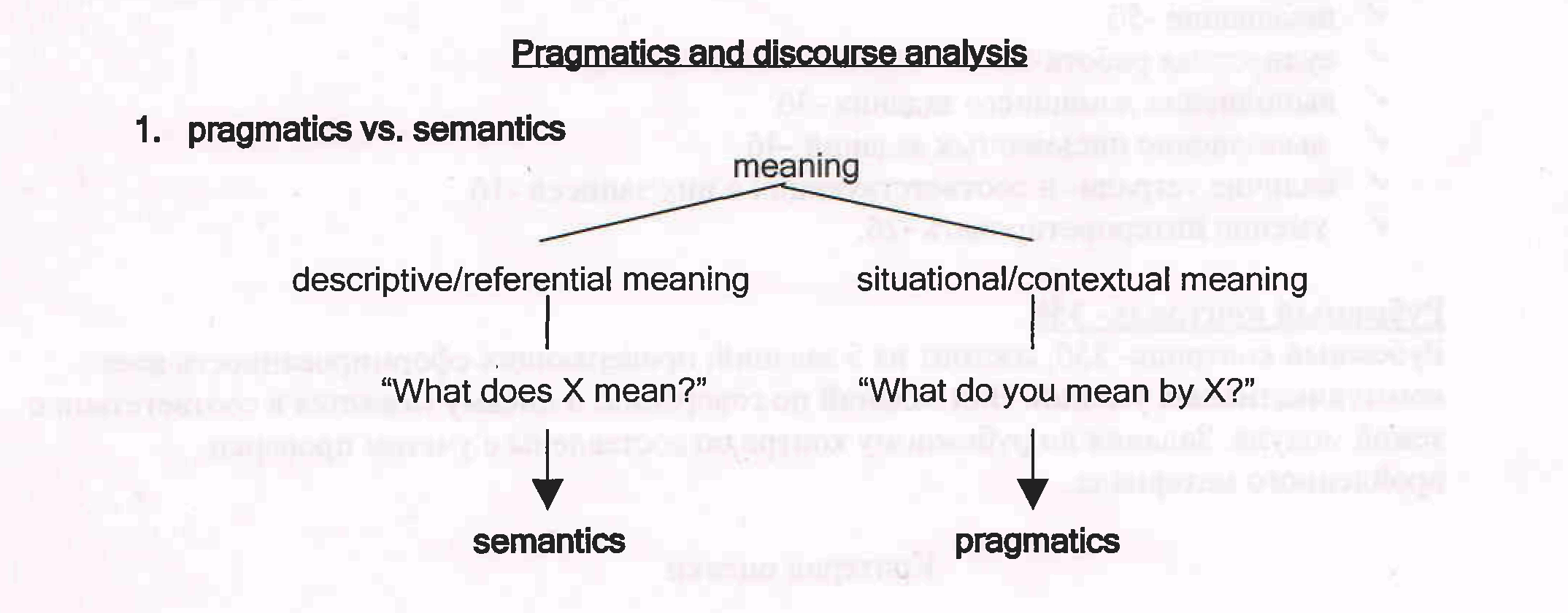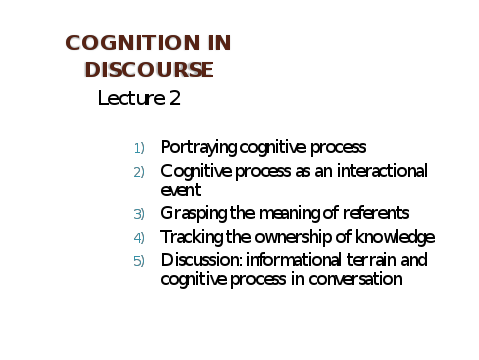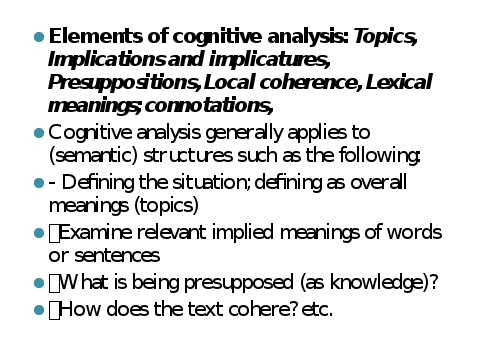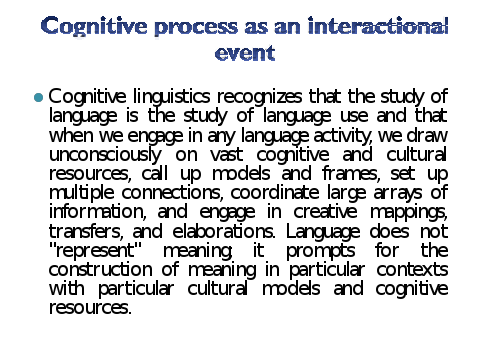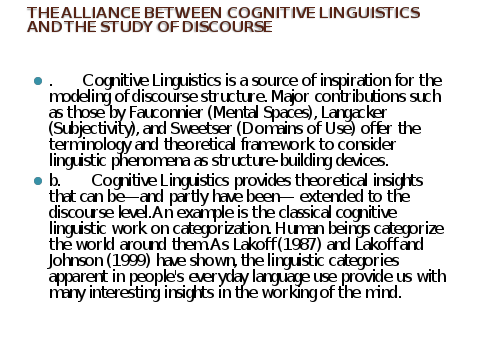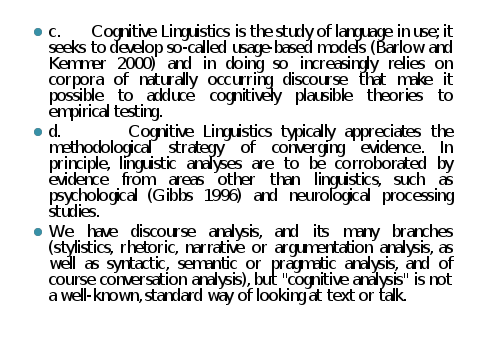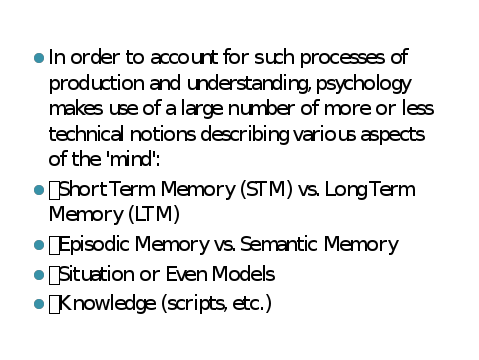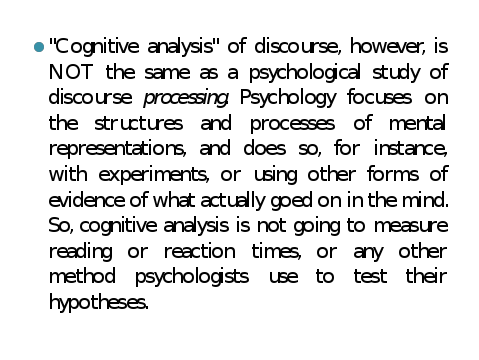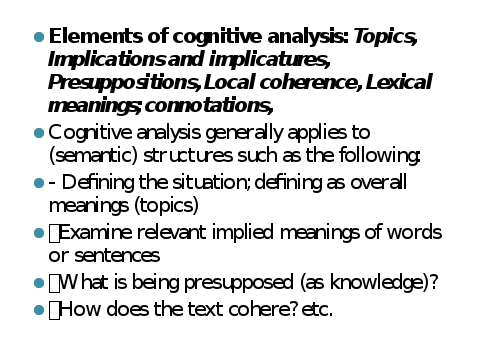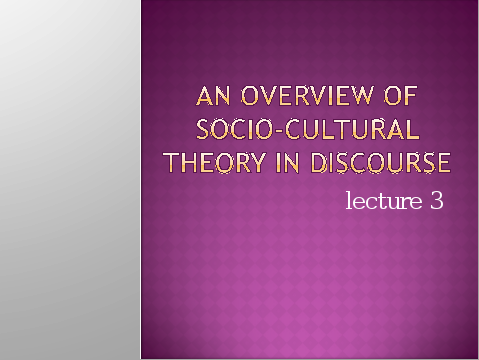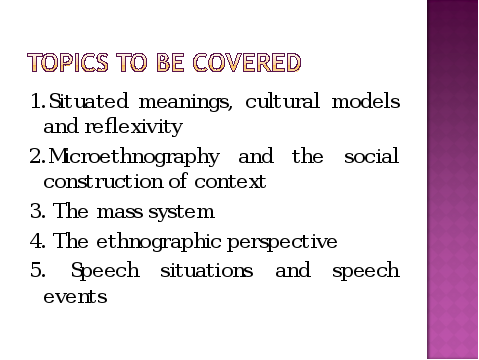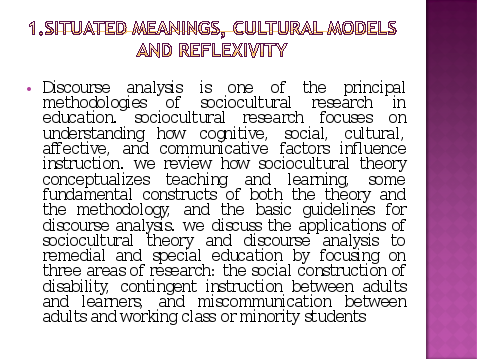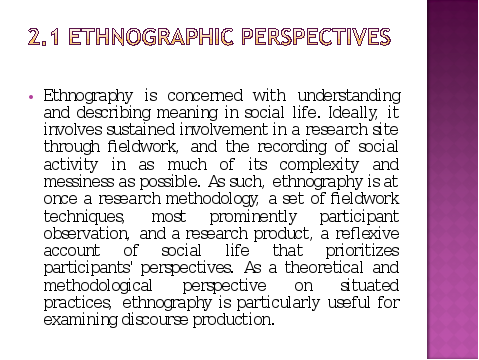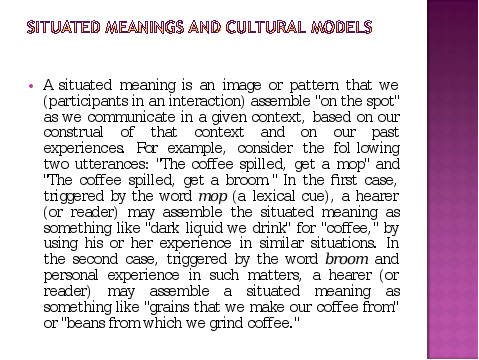In linguistics, discourse refers to a unit of language longer than a single sentence. The word discourse is derived from the latin prefix dis- meaning «away» and the root word currere meaning «to run». Discourse, therefore, translates to «run away» and refers to the way that conversations flow. To study discourse is to analyze the use of spoken or written language in a social context.
Discourse studies look at the form and function of language in conversation beyond its small grammatical pieces such as phonemes and morphemes. This field of study, which Dutch linguist Teun van Dijk is largely responsible for developing, is interested in how larger units of language—including lexemes, syntax, and context—contribute meaning to conversations.
Definitions and Examples of Discourse
«Discourse in context may consist of only one or two words as in stop or no smoking. Alternatively, a piece of discourse can be hundreds of thousands of words in length, as some novels are. A typical piece of discourse is somewhere between these two extremes,» (Hinkel and Fotos 2001).
«Discourse is the way in which language is used socially to convey broad historical meanings. It is language identified by the social conditions of its use, by who is using it and under what conditions. Language can never be ‘neutral’ because it bridges our personal and social worlds,» (Henry and Tator 2002).
Contexts and Topics of Discourse
The study of discourse is entirely context-dependent because conversation involves situational knowledge beyond just the words spoken. Often times, meaning cannot be extrapolated from an exchange merely from its verbal utterances because there are many semantic factors involved in authentic communication.
«The study of discourse…can involve matters like context, background information or knowledge shared between a speaker and hearer,» (Bloor and Bloor 2013).
Subcategories of Discourse
«Discourse can…be used to refer to particular contexts of language use, and in this sense, it becomes similar to concepts like genre or text type. For example, we can conceptualize political discourse (the sort of language used in political contexts) or media discourse (language used in the media).
In addition, some writers have conceived of discourse as related to particular topics, such as an environmental discourse or colonial discourse…Such labels sometimes suggest a particular attitude towards a topic (e.g. people engaging in environmental discourse would generally be expected to be concerned with protecting the environment rather than wasting resources). Related to this, Foucault…defines discourse more ideologically as ‘practices which systematically form the objects of which they speak’,» (Baker and Ellece 2013).
Discourse in Social Sciences
«Within social science…discourse is mainly used to describe verbal reports of individuals. In particular, discourse is analyzed by those who are interested in language and talk and what people are doing with their speech. This approach [studies] the language used to describe aspects of the world and has tended to be taken by those using a sociological perspective,» (Ogden 2002).
Common Ground
Discourse is a joint activity requiring active participation from two or more people, and as such is dependent on the lives and knowledge of two or more people as well as the situation of the communication itself. Herbert Clark applied the concept of common ground to his discourse studies as a way of accounting for the various agreements that take place in successful communication.
«Discourse is more than a message between sender and receiver. In fact, sender and receiver are metaphors that obfuscate what is really going on in communication. Specific illocutions have to be linked to the message depending on the situation in which discourse takes place…Clark compares language in use with a business transaction, paddling together in a canoe, playing cards or performing music in an orchestra.
A central notion in Clark’s study is common ground. The joint activity is undertaken to accumulate the common ground of the participants. With common ground is meant the sum of the joint and mutual knowledge, beliefs and suppositions of the participants,» (Renkema 2004).
Sources
- Baker, Paul, and Sibonile Ellece. Key Terms in Discourse Analysis. 1st ed., Bloomsbury Academic, 2013.
- Bloor, Meriel, and Thomas Bloor. Practice of Critical Discourse Analysis: An Introduction. Routledge, 2013.
- Henry, Frances, and Carol Tator. Discourses of Domination: Racial Bias in the Canadian English-Language Press. University of Toronto, 2002.
- Hinkel, Eli, and Sandra Fotos, editors. New Perspectives on Grammar Teaching in Second Language Classrooms. Lawrence Erlbaum, 2001.
- Ogden, Jane. Health and the Construction of the Individual. Routledge, 2002.
- Renkema, Jan. Introduction to Discourse Studies. John Benjamins, 2004.
- Van Dijk, Teun Adrianus. Handbook of Discourse Analysis. Academic, 1985.
From Wikipedia, the free encyclopedia
Discourse is a generalization of the notion of a conversation to any form of communication.[1] Discourse is a major topic in social theory, with work spanning fields such as sociology, anthropology, continental philosophy, and discourse analysis. Following pioneering work by Michel Foucault, these fields view discourse as a system of thought, knowledge, or communication that constructs our experience of the world. Since control of discourse amounts to control of how the world is perceived, social theory often studies discourse as a window into power. Within theoretical linguistics, discourse is understood more narrowly as linguistic information exchange and was one of the major motivations for the framework of dynamic semantics, in which expressions’ denotations are equated with their ability to update a discourse context.
[edit]
In the humanities and social sciences, discourse describes a formal way of thinking that can be expressed through language. Discourse is a social boundary that defines what statements can be said about a topic. Many definitions of discourse are largely derived from the work of French philosopher Michel Foucault. In sociology, discourse is defined as «any practice (found in a wide range of forms) by which individuals imbue reality with meaning».[2]
Political science sees discourse as closely linked to politics[3][4] and policy making.[5] Likewise, different theories among various disciplines understand discourse as linked to power and state, insofar as the control of discourses is understood as a hold on reality itself (e.g. if a state controls the media, they control the «truth»). In essence, discourse is inescapable, since any use of language will have an effect on individual perspectives. In other words, the chosen discourse provides the vocabulary, expressions, or style needed to communicate. For example, two notably distinct discourses can be used about various guerrilla movements, describing them either as «freedom fighters» or «terrorists».
In psychology, discourses are embedded in different rhetorical genres and meta-genres that constrain and enable them—language talking about language. This is exemplified in the APA’s Diagnostic and Statistical Manual of Mental Disorders, which tells of the terms that have to be used in speaking about mental health, thereby mediating meanings and dictating practices of professionals in psychology and psychiatry.[6]
Modernism[edit]
Modernist theorists were focused on achieving progress and believed in the existence of natural and social laws which could be used universally to develop knowledge and thus a better understanding of society.[7] Such theorists would be preoccupied with obtaining the «truth» and «reality», seeking to develop theories which contained certainty and predictability.[8] Modernist theorists therefore understood discourse to be functional.[9] Discourse and language transformations are ascribed to progress or the need to develop new or more «accurate» words to describe new discoveries, understandings, or areas of interest.[9] In modernist theory, language and discourse are dissociated from power and ideology and instead conceptualized as «natural» products of common sense usage or progress.[9] Modernism further gave rise to the liberal discourses of rights, equality, freedom, and justice; however, this rhetoric masked substantive inequality and failed to account for differences, according to Regnier.[10]
Structuralism (Saussure & Lacan)[edit]
Structuralist theorists, such as Ferdinand de Saussure and Jacques Lacan, argue that all human actions and social formations are related to language and can be understood as systems of related elements.[11] This means that the «individual elements of a system only have significance when considered in relation to the structure as a whole, and that structures are to be understood as self-contained, self-regulated, and self-transforming entities».[11]: 17 In other words, it is the structure itself that determines the significance, meaning and function of the individual elements of a system. Structuralism has made an important contribution to our understanding of language and social systems.[12] Saussure’s theory of language highlights the decisive role of meaning and signification in structuring human life more generally.[11]
Poststructuralism (Foucault)[edit]
Following the perceived limitations of the modern era, emerged postmodern theory.[7] Postmodern theorists rejected modernist claims that there was one theoretical approach that explained all aspects of society.[8] Rather, postmodernist theorists were interested in examining the variety of experiences of individuals and groups and emphasized differences over similarities and common experiences.[9]
In contrast to modernist theory, postmodern theory is more fluid, allowing for individual differences as it rejects the notion of social laws. Such theorists shifted away from truth-seeking, and instead sought answers for how truths are produced and sustained. Postmodernists contended that truth and knowledge are plural, contextual, and historically produced through discourses. Postmodern researchers therefore embarked on analyzing discourses such as texts, language, policies, and practices.[9]
Foucault[edit]
In the works of the philosopher Michel Foucault, a discourse is “an entity of sequences, of signs, in that they are enouncements (énoncés).”[13] The enouncement (l’énoncé, “the statement”) is a linguistic construct that allows the writer and the speaker to assign meaning to words and to communicate repeatable semantic relations to, between, and among the statements, objects, or subjects of the discourse.[13] There exist internal relations among the signs (semiotic sequences) that are between and among the statements, objects, or subjects of the discourse. The term discursive formation identifies and describes written and spoken statements with semantic relations that produce discourses. As a researcher, Foucault applied the discursive formation to analyses of large bodies of knowledge, e.g. political economy and natural history.[14]
In The Archaeology of Knowledge (1969), a treatise about the methodology and historiography of systems of thought (“epistemes”) and of knowledge (“discursive formations”), Michel Foucault developed the concepts of discourse. The sociologist Iara Lessa summarizes Foucault’s definition of discourse as «systems of thoughts composed of ideas, attitudes, courses of action, beliefs, and practices that systematically construct the subjects and the worlds of which they speak.»[15] Foucault traces the role of discourse in the legitimation of society’s power to construct contemporary truths, to maintain said truths, and to determine what relations of power exist among the constructed truths; therefore discourse is a communications medium through which power relations produce men and women who can speak.[9]
The inter-relation between power and knowledge renders every human relationship into a power negotiation,[16] because power is always present and so produces and constrains the truth.[9] Power is exercised through rules of exclusion (discourses) that determine what subjects people can discuss; when, where, and how a person may speak; and determines which persons are allowed speak.[13] That knowledge is both the creator of power and the creation of power, Foucault coined the term power-knowledge to show that an object becomes a «node within a network» of meanings. In The Archaeology of Knowledge, Foucault’s example is a book’s function as a node within a network meanings. The book does not exist as an individual object, but exists as part of a structure of knowledge that is «a system of references to other books, other texts, other sentences.» In the critique of power–knowledge, Foucault identified Neo-liberalism as a discourse of political economy which is conceptually related to governmentality, the organized practices (mentalities, rationalities, techniques) with which people are governed.[17][18]
Interdiscourse studies the external semantic relations among discourses, because a discourse exists in relation to other discourses, e.g. books of history; thus do academic researchers debate and determine “What is a discourse?” and “What is not a discourse?” in accordance with the denotations and connotations (meanings) used in their academic disciplines.[14]
Discourse analysis[edit]
In discourse analysis, discourse is a conceptual generalization of conversation within each modality and context of communication. In this sense, the term is studied in corpus linguistics, the study of language expressed in corpora (samples) of «real world» text.
Moreover, because a discourse is a body of text meant to communicate specific data, information, and knowledge, there exist internal relations in the content of a given discourse, as well as external relations among discourses. As such, a discourse does not exist per se (in itself), but is related to other discourses, by way of inter-discursive practices.
In Francois Rastier’s approach to semantics, discourse is understood as meaning the totality of codified language (i.e., vocabulary) used in a given field of intellectual enquiry and of social practice, such as legal discourse, medical discourse, religious discourse, etc.[19] In this sense, along with that of Foucault’s in the previous section, the analysis of a discourse examines and determines the connections among language and structure and agency.
Formal semantics and pragmatics[edit]
In formal semantics and pragmatics, discourse is often viewed as the process of refining the information in a common ground. In some theories of semantics such as discourse representation theory, sentences’ denotations themselves are equated with functions which update a common ground.[20][21][22][23]
See also[edit]
- Common ground
- Conversational scoreboard
- Critical discourse analysis
- Deconstruction
- Difference (philosophy)
- Discipline and Punish
- Discourse community
- Discursive dominance
- Discourse Studies
- Dynamic semantics
- Episteme
- Foucauldian discourse analysis
- Interdiscursivity
- Parrhesia
- Post-structuralism
- Pragmatics
- The Philosophical Discourse of Modernity, a 1985 book by Jürgen Habermas, regarded as an important contribution to Frankfurt School critical theory
- Public speaking
- Rhetoric
References[edit]
- ^ The noun derives from a Latin verb meaning “running to and fro”. For a concise historical account of the term and the concept see Dorschel, Andreas. 2021. «Diskurs.» Pp. 110–114 in Zeitschrift für Ideengeschichte XV/4: Falschmünzer, edited by M. Mulsow, & A.U. Sommer. Munich: C.H. Beck.
- ^ Ruiz, Jorge R. (2009-05-30). «Sociological discourse analysis: Methods and logic». Forum: Qualitative Social Research. 10 (2): Article 26.
- ^ «Politics, Ideology, and Discourse» (PDF). Retrieved 2019-01-27.
- ^ van Dijk, Teun A. «What is Political Discourse Analysis?» (PDF). Retrieved 2020-03-21.
- ^ Feindt, Peter H.; Oels, Angela (2005). «Does discourse matter? Discourse analysis in environmental policy making». Journal of Environmental Policy & Planning. 7 (3): 161–173. doi:10.1080/15239080500339638. S2CID 143314592.
- ^ Schryer, Catherine F., and Philippa Spoel. 2005. «Genre theory, health-care discourse, and professional identity formation.» Journal of Business and Technical Communication 19: 249. Retrieved from SAGE.
- ^ a b Larrain, Jorge. 1994. Ideology and Cultural Identity: Modernity and the Third World Presence. Cambridge: Polity Press. ISBN 9780745613154. Retrieved via Google Books.
- ^ a b Best, Steven; Kellner, Douglas (1997). The Postmodern Turn. New York City: The Guilford Press. ISBN 978-1-57230-221-1.
- ^ a b c d e f g Strega, Susan. 2005. «The View from the Poststructural Margins: Epistemology and Methodology Reconsidered.» Pp. 199–235 in Research as Resistance, edited by L. Brown, & S. Strega. Toronto: Canadian Scholars’ Press.
- ^ Regnier, 2005
- ^ a b c Howarth, D. (2000). Discourse. Philadelphia: Open University Press. ISBN 978-0-335-20070-2.
- ^ Sommers, Aaron. 2002. «Discourse and Difference.» Cosmology and our View of the World, University of New Hampshire. Seminar summary.
- ^ a b c M. Foucault (1969). L’Archéologie du savoir. Paris: Éditions Gallimard.
- ^ a b M. Foucault (1970). The Order of Things. Pantheon Books. ISBN 0-415-26737-4.
- ^ Lessa, Iara (February 2006). «Discursive Struggles within Social Welfare: Restaging Teen Motherhood». The British Journal of Social Work. 36 (2): 283–298. doi:10.1093/bjsw/bch256.
- ^ Foucault, Michel. Power/Knowledge: Selected Interviews and Other Writings, 1972–1977 (1980) New York City: Pantheon Books.
- ^ “Governmentality”, A Dictionary of Geography (2004) Susan Mayhew, Ed., Oxford University Press, p. 0000.
- ^ Foucault, Michel. The Birth of Biopolitics: Lectures at the Collège de France, 1978–1979 (2008) New York: Palgrave MacMillan, pp. 0000.
- ^ Rastier, Francois, ed. (June 2001). «A Little Glossary of Semantics». Texto! Textes & Cultures (Electronic journal) (in French). Translated by Larry Marks. Institut Saussure. ISSN 1773-0120. Retrieved 5 April 2020.
- ^ Green, Mitchell (2020). «Speech Acts». In Zalta, Edward (ed.). Stanford Encyclopedia of Philosophy. Retrieved 2021-03-05.
- ^ Pagin, Peter (2016). «Assertion». In Zalta, Edward (ed.). Stanford Encyclopedia of Philosophy. Retrieved 2021-03-05.
- ^ Nowen, Rick; Brasoveanu, Adrian; van Eijck, Jan; Visser, Albert (2016). «Dynamic Semantics». In Zalta, Edward (ed.). The Stanford Encyclopedia of Philosophy. Retrieved 2020-08-11.
- ^ Stalnaker, Robert (1978). «Assertion». In Cole, P (ed.). Syntax and Semantics, Vol. IX: Pragmatics. Academic Press.
Further reading[edit]
- Foucault, Michel (1972) [1969]. Archaeology of Knowledge. New York: Pantheon Books. ISBN 978-0-415-28752-4.
- — (1977). Discipline and Punish. New York: Pantheon Books. ISBN 978-0-394-49942-0.
- — (1980). «Two Lectures,» in Power/Knowledge: Selected Interviews, edited by C. Gordon. New York; Pantheon Books.
- — (2003). Society Must Be Defended. New York: Picador. ISBN 978-0-312-42266-0.
- McHoul, Alec; Grace, Wendy (1993). A Foucault Primer: Discourse, Power, and the Subject. Melbourne: Melbourne University Press. ISBN 978-0-8147-5480-1.
- Motion, J.; Leitch, S. (2007). «A Toolbox for Public Relations: The Oeuvre of Michel Foucault». Public Relations Review. 33 (3): 263–268. doi:10.1016/j.pubrev.2007.05.004. hdl:1959.3/76588.
- R. Mullaly, Robert (1997). Structural Social Work: Ideology, Theory, and Practice (2nd ed.). New York City: Oxford University Press. ISBN 978-0-7710-6673-3.
- Howard, Harry. (2017). «Discourse 2.» Brain and Language, Tulane University. [PowerPoint slides].
- Norton, Bonny (1997). «Language, identity, and the ownership of English». TESOL Quarterly. 31 (3): 409–429. doi:10.2307/3587831. JSTOR 3587831.
- Sunderland, J. (2004). Gendered Discourses. New York City: Palgrave Macmillan.
External links[edit]
Wikiquote has quotations related to Discourse.
- DiscourseNet, an international association for discourse studies.
- Beyond open access: open discourse, the next great equalizer, Retrovirology 2006, 3:55
- Discourse (Lun) in the Chinese tradition
Noun
Hans Selye, a Czech physician and biochemist at the University of Montreal, took these ideas further, introducing the term «stress» (borrowed from metallurgy) to describe the way trauma caused overactivity of the adrenal gland, and with it a disruption of bodily equilibrium. In the most extreme case, Selye argued, stress could wear down the body’s adaptation mechanisms, resulting in death. His narrative fit well into the cultural discourse of the cold-war era, where, Harrington writes, many saw themselves as «broken by modern life.»
—
Such is the exquisite refinement of American political discourse in the early 21st century.
—
Literature records itself, shows how its records might be broken, and how the assumptions of a given discourse or culture might thereby be challenged. Shakespeare is, again, the great example.
—
He likes to engage in lively discourse with his visitors.
She delivered an entertaining discourse on the current state of the film industry.
Verb
The most energetic ingredients in a Ken Burns documentary are the intervals of commentary, the talking heads of historians, sociologists, and critics coming at us in living color and discoursing volubly.
—
Clarke had discoursed knowledgeably on the implications of temperature for apples; it was too cool here for … Winesaps, or Granny Smiths, none of which mature promptly enough to beat autumn’s first freeze.
—
… Bill Clinton was up in the sky-box suites, giving interviews. So The Baltimore Sun’s guy on the job was Carl Cannon and he took notes while Clinton discoursed on the importance of Ripken’s streak, the value of hard work, the lessons communicated to our youth in a nation troubled by blah blah blah.
—
She could discourse for hours on almost any subject.
the guest lecturer discoursed at some length on the long-term results of the war
See More
Recent Examples on the Web
Dialog, discourse, and engagement are essential elements of a university’s function, whether in the classroom, across and among governance units, or between the institution and its external constituents (e.g., alumni, community members, legislators).
—
Political discourse?
—
Others wrote that family love should transcend politics, that public discourse could stop at the threshold.
—
The former is discourse, which is very much within the scope of acceptable behavior toward a public figure; the latter is harassment, which is very much not.
—
At the same time, his government has sought to remove nuance from public discourse, Mr. Wani says.
—
That’s the larger, more important discourse ahead, and Thao will have to steer it while being abundantly transparent on why her strict stance on accountability is in everyone’s best interest, especially Black Oaklanders.
—
All this nepo-baby discourse, all this talk of leg-ups and familial privilege, and in 2010, a 16-year-old, completely unknown Harry Styles skived off school and walked into an X Factor audition.
—
Because there was also, at the same time, a discourse going on, which is still ongoing, about how Trump was actually the summation of all of these fringe traditions in American politics.
—
Those qualities reflected not just in the appearance of, or discourse around, these cultural products, but in the execution of the products themselves.
—
Harassment, even if technically not against the law, is wrong and corrosive to discourse.
—
That means the College Football Playoff’s four-team system that was introduced in 2014 and has become part of Alabama fans’ discourse each November will end after the upcoming 2023 season.
—
But like art made in other arenas, prison art exists in relation to economies, power structures governing resources and access, and discourses that legitimate certain works as art and others as craft, material object, historical artifact, or trash.
—
Backed by a five-piece band, Janelle McDermoth discourses on life, death and the arguable usefulness of art.
—
In a 2016 article, Krauze discoursed on populism: The term has different meanings, or at least overtones, in different regions of the world and in different political traditions.
—
In the audience plump dignitaries in bright orange turbans sat comfortably on white leather armchairs, discoursing on the spectacle.
—
Knights, serfs, monks, men-at-arms, artisans, and shopkeepers traveled these pungent ways, discoursing loudly in decayed Latic and foreign tongues ranging from English to Syrian.
—
See More
These examples are programmatically compiled from various online sources to illustrate current usage of the word ‘discourse.’ Any opinions expressed in the examples do not represent those of Merriam-Webster or its editors. Send us feedback about these examples.
Britannica Dictionary definition of DISCOURSE
formal
1
[noncount]
:
the use of words to exchange thoughts and ideas
-
It’s a word that doesn’t have much use in ordinary discourse. [=conversation]
-
He likes to engage in lively discourse with his visitors.
-
public/political discourse
2
[count]
:
a long talk or piece of writing about a subject
-
She delivered an entertaining discourse on the current state of the film industry.
Britannica Dictionary definition of DISCOURSE
:
to talk about something especially for a long time
-
She could discourse for hours on/about almost any subject.
Discourse refers to the use of language beyond single sentences. Discourse is an important study for the English language because it allows individuals to express their ideas and thoughts effectively, understand and interpret the perspectives and opinions of others, and build relationships through effective communication. Discourse analysis is also critical for language teachers and researchers to better understand language use and development.
What is the definition of discourse?
Discourse is the verbal or written exchange of ideas. Any unit of connected speech or writing that is longer than a sentence and that has a coherent meaning and a clear purpose is referred to as discourse.
An example of discourse is when you discuss something with your friends in person or over a chat platform. Discourse can also be when someone expresses their ideas on a particular subject in a formal and orderly way, either verbally or in writing.
Most of what we know of discourse today is thanks to the French philosopher, writer and literary critic Michel Foucault, who developed and popularised the concept of discourse. You can read about his use of the term in The Archeology of Knowledge and Discourse on Language (1969).

What is the function of discourse?
Discourse has significant importance in human behaviour and the development of human societies. It can refer to any kind of communication.
Spoken discourse is how we interact with each other, as we express and discuss our thoughts and feelings. Think about it — isn’t conversation a huge part of our daily lives? Conversations can enrich us, especially when they are polite and civil.
Civil discourse is a conversation in which all parties are able to equally share their views without being dominated. Individuals engaged in civil discourse aim to enhance understanding and the social good through frank and honest dialogue. Engaging in such conversations helps us live peacefully in society.
What is more, written discourse (which can consist of novels, poems, diaries, plays, film scripts etc.) provides records of decades-long shared information. How many times have you read a book that gave you an insight into what people did in the past? And how many times have you watched a film which made you feel less alone because it showed you that someone out there feels the same way you do?
‘Discourse analysis’ is the study of spoken or written language in context and explains how language defines our world and our social relations.
What is Critical Discourse Analysis?
Critical discourse analysis is an interdisciplinary method in the study of discourse that is used to examine language as a social practice. The method is aimed at the form, structure, content and reception of discourse, in both spoken and written forms. Critical discourse analysis explores social relations, social problems, and the ‘ role of discourse on the production and reproduction of power abuse or domination in communications’.
Teun A. van Dijk offers this definition of CDA in ‘Multidisciplinary Critical Discourse Analysis: A plea for diversity.’ (2001).
CDA explores the relationship between language and power. Because language both shapes and is shaped by society, CDA offers an explanation of why and how discourse works.
The social context in which discourse occurs influences how participants speak or write.
If you write an email to apply for a job, you would most likely use more formal language, as this is socially acceptable in that situation.
At the same time, the way in which people speak ultimately influences the social context.
If you are meeting your new boss and you have prepared for a formal conversation, but all of your other colleagues are chatting with your boss in a more casual manner, you would do the same as everyone else, in this way changing what is expected.
By examining these social influences, critical discourse analysis explores social structures and issues even further. Critical discourse analysis is problem or issue-oriented: it must successfully study relevant social problems in language and communication, such as racism, sexism, and other social inequalities in conversation. The method allows us to look into the sociopolitical context — power structures and the abuse of power in society.
Critical discourse analysis is often used in the study of rhetoric in political discourse, media, education and other forms of speech that deal with the articulation of power.
Linguist Norman Fairclough’s (1989, 1995) model for CDA consists of three processes for analysis, tied to three interrelated dimensions of discourse:
- The object of analysis (including visual or verbal texts).
- The process by which the object was produced and received by people (including writing, speaking, designing and reading, listening, and viewing).
- The socio-historical conditions that inform or influence these processes.
Tip: These three dimensions require different types of analysis, such as text analysis (description), processing analysis (interpretation), and social analysis (explanation). Think about when your teacher asks you to analyse a newspaper and determine its author’s bias. Is the author’s bias related to their social background or their culture?
Simply put, critical discourse analysis studies the underlying ideologies in communication. A multidisciplinary study explores relations of power, dominance, and inequality, and the ways these are reproduced or resisted by social groups via spoken or written communication.
Language is used to establish and reinforce societal power, which individuals or social groups can achieve through discourse (also known as ‘rhetorical modes’).
What are the four types of discourse?
The four types of discourse are description, narration, exposition and argumentation.
| Types of discourse | Purpose for the type of discourse |
| Description | Helps the audience visualise the item or subject by relying on the five senses. |
| Narration | Aims to tell a story through a narrator, who usually gives an account of an event. |
| Exposition | Conveys background information to the audience in a relatively neutral way. |
| Argumentation | Aims to persuade and convince the audience of an idea or a statement. |
Description
Description is the first type of discourse. Description helps the audience visualise the item or subject by relying on the five senses. Its purpose is to depict and explain the topic by the way things look, sound, taste, feel, and smell. Description helps readers visualise characters, settings, and actions with nouns and adjectives. Description also establishes mood and atmosphere (think pathetic fallacy in William Shakespeare’s Macbeth (1606).
Examples of the descriptive mode of discourse include the descriptive parts of essays and novels. Description is also frequently used in advertisements.
Let’s look at this example from the advert for One Bottle by One Movement:
‘Beautiful, functional, versatile and sustainable.
At 17 oz / 500ml it’s the only bottle you’ll ever need, using double-wall stainless steel which will keep your drinks cold for 24 hours or piping hot for 12. It’s tough, light and dishwasher safe.’
The advert uses descriptive language to list the qualities of the bottle. The description can affect us; it may even persuade us to buy the bottle by making us visualise exactly what the bottle looks and feels like.
Narration
Narration is the second type of discourse. The aim of narration is to tell a story. A narrator usually gives an account of an event, which usually has a plot. Examples of the narrative mode of discourse are novels, short stories, and plays.
Consider this example from Shakespeare’s tragedy Romeo and Juliet (1597):
‘Two households, both alike in dignity,
In fair Verona, where we lay our scene,
From ancient grudge break to new mutiny,
Where civil blood makes civil hands unclean.
From forth the fatal loins of these two foes
A pair of star-cross’d lovers take their life;
Whose misadventured piteous overthrows
Do with their death bury their parents’ strife.’¹
Shakespeare uses a narrative to set the scene and tell the audience what will occur during the course of the play. Although this introduction to the play gives the ending away, it doesn’t spoil the experience for the audience. On the contrary, because the narration emphasises emotion, it creates a strong sense of urgency and sparks interest. Hearing or reading this as an audience, we are eager to find out why and how the ‘pair of star-cross’d lovers take their life’.
Exposition
Exposition is the third type of discourse. Exposition is used to convey background information to the audience in a relatively neutral way. In most cases, it doesn’t use emotion and it doesn’t aim to persuade.
Examples of discourse exposure are definitions and comparative analysis.
What is more, exposure serves as an umbrella term for modes such as:
Exemplification (illustration): The speaker or writer uses examples to illustrate their point.
Michael Jackson is one of the most famous artists in the world. His 1982 album ‘Thriller’ is actually the best-selling album of all time — it has sold more than 120 million copies worldwide.
Cause / Effect: The speaker or writer traces reasons (causes) and outcomes (effects).
I forgot to set my alarm this morning and I was late for work.
Comparison / Contrast: The speaker or writer examines the similarities and differences between two or more items.
Harry Potter and the Philosopher’s Stone is shorter than Harry Potter and the Deathly Hallows.
Definition: The speaker or writer explains a term, often using examples to emphasise their point.
Rock is a type of popular music originating in the late 1960s and 70s and characterized by a heavy beat and simple melodies. One of the most famous rock songs is ‘Smoke on the Water’ by the English band Deep Purple.
Problem / Solution: The speaker or writer draws attention to a particular issue (or issues) and offers ways in which it can be resolved (solutions).
Climate change is possibly the biggest issue humanity has ever faced. It is a largely man-made problem that can be solved by the creative use of technology.
Argumentation
Argumentation is the fourth type of discourse. The aim of argumentation is to persuade and convince the audience of an idea or a statement. To achieve this, argumentation relies heavily on evidence and logic.
Lectures, essays and public speeches are all examples of the argumentative mode of discourse.
Take a look at this example — an excerpt from Martin Luther King Jr.’s famous speech ‘I Have a Dream’ (1963):
‘I have a dream that one day this nation will rise up and live out the true meaning of its creed: We hold these truths to be self-evident, that all men are created equal. (…). This will be the day when all of God’s children will be able to sing with new meaning: My country, ’tis of thee, sweet land of liberty, of thee I sing. Land where my fathers died, land of the pilgrims’ pride, from every mountainside, let freedom ring. And if America is to be a great nation, this must become true.‘²
In his speech, Martin Luther King Jr. successfully argued that African Americans should be treated equally to white Americans. He rationalised and validated his claim. By quoting the United States Declaration of Independence (1776), King argued that the country could not live up to the promises of its founders unless all its citizens lived in it freely and possessed the same rights.
What are the three categories of literary discourse?
There are three categories of literary discourse — poetic, expressive, and transactional.
| Types of literary discourse | Purpose of literary discourse | Examples |
| Poetic discourse | Poetic devices are incorporated (such as rhyme, rhythm, and style) to emphasise the speaker’s expression of feelings or description of events and places. |
|
| Expressive discourse | Literary writing that focuses on the non-fictional to generate ideas and reflect the author’s emotions, usually without presenting any facts or arguments. |
|
| Transactional discourse | An instructional approach that encourages action by presenting a clear, non-ambiguous plan to the reader and is usually written in an active voice. |
|
Poetic discourse
Poetic discourse is a type of literary communication in which special intensity is given to a text through distinctive diction (such as rhyme), rhythm, style, and imagination. It incorporates different poetic devices to emphasise the poet’s expression of feelings, thoughts, ideas or description of events and places. Poetic discourse is most common in poetry but it is also frequently used by writers of prose.
Let’s look at this example from the tragedy Macbeth (1606) by William Shakespeare:
‘To-morrow, and to-morrow, and to-morrow,
Creeps in this petty pace from day to day,
To the last syllable of recorded time;
And all our yesterdays have lighted fools
The way to dusty death. Out, out, letter candle!
Life’s but a walking shadow, a poor player
That struts and frets his hour upon the stage
And then is heard no more. It is a tale
Told by an idiot, full of sound and fury
Signifying nothing.’ ³
In this soliloquy, Macbeth mourns the death of his wife, Lady Macbeth, and ponders the futility of an unfulfilled life. The use of literary devices and poetic techniques, such as repetition, metaphor and imagery, evokes strong emotions.
Expressive discourse
Expressive discourse refers to literary writing that is creative but not fictional. This writing aims to generate ideas and to reflect the author’s emotions, usually without presenting any facts or arguments.
Expressive discourse includes diaries, letters, memoirs, and blog posts.
Consider this example from The Diary of Anaïs Nin (1934-1939):
‘I was never one with the world, yet I was to be destroyed with it. I always lived seeing beyond it. I was not in harmony with its explosions and collapse. I had, as an artist, another rhythm, another death, another renewal. That was it. I was not at one with the world, I was seeking to create one by other rules…. The struggle against destruction which I lived out in my intimate relationships had to be transposed and become of use to the whole world.’4
In her diaries, Nin reflects on her feelings of being a woman and an artist in the 20th century. She wrote this passage in preparation for leaving France at the start of World War Two. We can read her sense of the disconnection between her intense inner world and the violence of the outer world. This example is a trademark of expressive discourse, as it delves into personal ideas and explores inner thoughts and feelings.
Transactional discourse
Transactional discourse is an instructional approach that is used to encourage action. It presents a non-ambiguous plan that is clear to the reader and is usually written in an active voice. Transactional discourse is common in advertising, instruction manuals, guidelines, privacy policies, and business correspondence.
This excerpt from the novel The Midnight Library (2020) by Matt Haig is an example of transactional discourse:
‘An instruction manual for a washing machine is an example of transactional discourse:
1. Put washing detergent in the drawer2. Push the power button to switch on the power3. Select the suitable automatic programme4. Select the suitable delay wash programme5. Close the top lid6. Finish washing’ 5
This is a clear plan — a list of instructions. Haig uses transactional discourse as part of his work of fiction in order to add realism to the relative part of the story.
Discourse — key takeaways
- Discourse is another word for any kind of written or spoken communication. It is any unit of connected speech that is longer than a sentence, and that has a coherent meaning and a clear purpose.
- Discourse is crucial to human behaviour and social progress.
- Critical discourse analysis is an interdisciplinary method in the study of discourse that is used to examine language as a social practice.
- There are four types of discourse — Description, Narration, Exposition, and Argumentation.
- There are three categories of literary discourse — Poetic, Expressive, and Transactional.
- Discourse appears in Literature (both poetry and prose), speeches, advertisements, diaries, blog posts, definitions and verbal conversations.
SOURCE:
¹ William Shakespeare, Romeo and Juliet, 1597
² Martin Luther King Jr., ‘I Have a Dream’, 1963
³ William Shakespeare, Macbeth, 1606
4 Anaïs Nin, The Diary of Anaïs Nin, Vol. 2, 1934-1939
5 Matt Haig, The Midnight Library, 2020
The title discourse furnishes a central theme to which those following stand in relation. ❋ Gaius Glenn Atkins (1912)
Critically, the crux of the entire process in the development of these works was for Ravi the concept of Sannidhi which in traditional Indian aesthetic discourse translates as ‘proximity’ or ‘close by’ or ‘in the presence’. ❋ Unknown (2010)
Her book, which first appeared in French in 2008, combines three strands: a study of events; a detailed account of the social, economic, religious, cultural, political and administrative context of 12th-century Syria and Egypt; and an unrelenting investigation of what she calls the «discourse.» ❋ Christopher Tyerman (2011)
All that comes from debasing the discourse is a spoiled public forum. ❋ Unknown (2010)
How it shapes our discourse is a worthy topic for consideration. ❋ SVGL (2009)
By the way, using a script exotic to a discourse is a gratuitous and low form of argument. ❋ Unknown (2005)
I am the bread of life — Henceforth the discourse is all in the first person, «I,» «Me,» which occur in one form or other, as Stier reckons, thirty-five times. he that cometh to me — to obtain what the soul craves, and as the only all-sufficient and ordained source of supply. hunger … thirst — shall have conscious and abiding satisfaction. ❋ Unknown (1871)
Like Foucault, Kittler diagnosed the present through what he called discourse analysis — the excavation of the underlying structure of human practices. ❋ Stuart Jeffries (2011)
Severing political discussion from decision and action, however, focuses the locus of Habermasian politics strictly on discussion and what he calls a discourse theory of democracy. ❋ Unknown (2009)
McD reminds me of cruelly ridiculing your spouse at a cocktail party just for a cheap laugh; tells all around you reams abut your character and integrity; what a putz; and — whose payroll is he on? ours? guess loyality is relative; sell out your country and troops and call it «discourse» or «free speech» or «constructive criticism» so you can sleep at night. libs will surely be our collective death; ❋ Unknown (2006)
If you ask me, one of the most disturbing trends in American public discourse is the incredibly provincialism and solipsism of a lot of our policy debate. ❋ Unknown (2009)
The tone of most Internet discourse is historically libertarian, and Republicans did pretty well online for many years. ❋ Unknown (2009)
This level of discourse is “high school stoner speculation” stupid. ❋ Unknown (2009)
The discourse is how we find out what happened; the way the story gets told. ❋ Rebecca Tushnet (2009)
Still, though, we have ever-increasing access to information already, and the national discourse is decomposing before our eyes. ❋ Tom Toles (2010)
I am confident that I should not be trying to appear ‘English’ and hence, any directness or lack of tentativeness typical of Greek discourse, is certain to have crept into the way I use English. ❋ Unknown (2010)
But academic discourse is such a particular thing. ❋ Unknown (2009)
For me — and I think for a lot of people — the moment that «sanity» left the building in American discourse came in late 2002 and early 2003, when it became clear that Dick Cheney, George W. Bush, Paul Halfwits, and their minions were dead set on invading Iraq. ❋ Will Bunch (2010)
Human rights discourse is an essentially individualistic framework, whereas most cultures of the global South (or third world) are formed on a communitarian value system. ❋ Unknown (2009)
Their discourse was widely varied; they discussed [everything] from [Chaucer] to [ice fishing]. ❋ Danny_Luv17 (2008)
[Eagleton] is invoking an ethical obligation on the part of the intellectual to speak for, but also to, those whose consciousness is [lagging] behind whatever Hegelian discourse of [utopian] progress is being espoused.
I had a discourse with your mom last night. ❋ Bigtrick (2006)
You gotta be [Extremely Online] to [keep up with] the [discourse] ❋ Klaudunski (2021)
[Can’t wait] for the new [discourse] this [saturday] ❋ Commissar_nik (2021)
«No students what is the [discourse] of this [piece] of [text]» . . . . . . . . WTF! ❋ Wadup (2005)
[nerd]: [modern] discourses
[steve]: your fucking gay ❋ Taller Than You Kk Ty (2009)
I pointed out that murder was already illegal and that making it moreso with a special [gun murder] [statute] was a bit silly. [Reasoned discourse] broke out, and my comment vanished from the blog. ❋ GCynic (2012)
Hym «Sooo… The public [discourse] being democratized if bad (because why should a [golden god] have to acknowledge a peasant? He should be doing what everyone else is doing. And everyone else should be doing what I tell them. Then everything would be better for everyone.) but identity being democratized is good? That’s how people end up getting [lobotomized] or thrown in an oven. ..» ❋ Hym Iam (2022)
White lesbians [gatekeeping] [dyke], a word originated by black lesbians by not allowing bisexual people to say it is an example of [slur discourse]. ❋ Ihatepinkmonkeys (2021)
[Anne] runs a discourse account called ‘fairy.course’ on instagram. Anne has never [touched] a single [blade of grass] in her life. ❋ Boobie Fan 69 (2021)
Other forms: discourses; discoursed; discoursing
If you use the word discourse, you are describing a formal and intense discussion or debate.
The noun discourse comes from the Latin discursus to mean «an argument.» But luckily, that kind of argument does not mean people fighting or coming to blows. The argument in discourse refers to an exchange of ideas — sometimes heated — that often follows a kind of order and give-and-take between the participants. It’s the kind of argument and discussion that teachers love, so discourse away!
Definitions of discourse
-
noun
an extended communication (often interactive) dealing with some particular topic
-
noun
extended verbal expression in speech or writing
-
noun
an address of a religious nature (usually delivered during a church service)
Definitions of discourse
-
verb
consider or examine in speech or writing
-
verb
talk at length and formally about a topic
-
verb
carry on a conversation
-
synonyms:
converse
see moresee less-
types:
- show 11 types…
- hide 11 types…
-
argue, contend, debate, fence
have an argument about something
-
interview, question
conduct an interview in television, newspaper, and radio reporting
-
interview
discuss formally with (somebody) for the purpose of an evaluation
-
interview
go for an interview in the hope of being hired
-
chaffer, chat, chatter, chew the fat, chit-chat, chitchat, claver, confab, confabulate, gossip, jaw, natter, shoot the breeze, visit
talk socially without exchanging too much information
-
stickle
dispute or argue stubbornly (especially minor points)
-
spar
fight verbally
-
bicker, brabble, niggle, pettifog, quibble, squabble
argue over petty things
-
altercate, argufy, dispute, quarrel, scrap
have a disagreement over something
-
oppose
be against; express opposition to
-
jawbone, schmoose, schmooze, shmoose, shmooze
talk idly or casually and in a friendly way
-
type of:
-
speak, talk
exchange thoughts; talk with
DISCLAIMER: These example sentences appear in various news sources and books to reflect the usage of the word ‘discourse’.
Views expressed in the examples do not represent the opinion of Vocabulary.com or its editors.
Send us feedback
EDITOR’S CHOICE
Look up discourse for the last time
Close your vocabulary gaps with personalized learning that focuses on teaching the
words you need to know.
Sign up now (it’s free!)
Whether you’re a teacher or a learner, Vocabulary.com can put you or your class on the path to systematic vocabulary improvement.
Get started
Discourse:
Pragmatics and Interactional analysis in discourse
DEFINITION
OF DISCOURSE. The difference between text and discourse
Originally
the word ‘discourse’ comes from Latin ‘discursus‘
which denoted ‘conversation, speech’. Discourse is a term used in
LINGUISTICS to refer to a continuous stretch of (especially spoken)
LANGUAGE larger than a SENTENCE — but, within this broad notion,
several different applications may be found. At its most general, a
discourse is a behavioural UNIT which has a pre-theoretical status in
linguistics: it is a set of UTTERANCES which constitute any
recognisable SPEECH event, e.g. a conversation, a joke, a sermon, an
interview… [Crystal, Dictionary
of linguistics and phonetics,
3rd edn 1991]
In
the broad sense discourse ‘includes’ TEXT (q.v.),
but the two terms are not always easily distinguished, and are often
used synonymously.
Some
linguists would restrict discourse to spoken communication, and
reserve text for written:
Text
1.
result
of the process
of
speech production
in
graphic form
2.
indirect (processed) speech
3.
no personal contacts between agents
4.
perception of speech
in
different space
and
time
5.
one agent
Discourse
1.
The process of
speech
production
in
the form of a sound
2.
Spontaneous speech
in
a particular situation
with
the
help of verbal
and nonverbal means
3.
Personal contacts between agents
4.
generation and
perception
of speech
in
a
unity
of space
and
time
5.
two authors constantly change their roles ‘speaker – hearer’
(bilateral discourse).
There
are a number of approaches to discourse analysis and pragmatics is
one of them.
Definitions
of pragmatics:
The
underlying concepts behind pragmatics are meaning, context and
communication. Early researchers considered pragmatics as having
originated from semiosis, a process that involves the use of signs;
hence signs are central to pragmatics users. Pragmatics is a
broad approach to discourse that deals with the widely vast concepts
of meaning, context and communication. Due to the wide scope of
pragmatics, experts have failed to reach an agreement on the best
definition of this approach. In language, pragmatics and discourse
are closely connected. Discourse is the method, either written or
verbal, by which an idea is communicated in an orderly,
understandable fashion. Used as a verb, discourse refers to the
exchange of ideas or information through conversation. Comparatively,
pragmatics involve the use of language to meet specific needs or for
a predetermined purpose. As such, pragmatics and discourse are
related in that pragmatics are the means by which the purpose of
discourse is achieved.
Both
pragmatics and discourse involve concepts far deeper than mere word
definitions and sentence structure. Unlike grammar, which involves
the rules governing proper language structure, pragmatics and
discourse focus on the meaningfulness of spoken or written language.
Whether storytelling, explaining, instructing, or requesting, a
speaker or writer has an intended purpose for communicating. How a
speaker or writer constructs sentences to meet his intended
purpose
involves both pragmatics and discourse.
It
is only with the aid of considerations of a pragmatic nature that we
can go beyond the question «What does this utterance mean?»
and ask «Why was this utterance produced?».and explain how
utterances are interpreted and how successful interpretation of
utterances is managed. F.E.
1
Ms: (You should hurry up a little in persuading the PSOE, because
we’re all in a
hurry
to do all that)
Mr:
(Do you read the papers ?)
To
know why Mr (Maragall) asks the question, we need to bear in mind
quite a number of considerations of a pragmatic nature, for example,
the degree of relevance of the question: in fact considerable, given
that this is a political debate.
While
discourse analysis can only explain that this is a reply to the
observation made by Ms (Mas) or explain what type of sentences make
up each of the utterances, pragmatics will explain what kind of reply
it is, based on one or more implicatures. For example, «if you
read the newspapers you will know that I have done so many times»,
or «as I am sure that you read the newspapers, I think you know
perfectly well that I have done so, therefore your observation is
unnecessary». Taking a pragmatic approach, the linguist can
successfully
uncover
the intention that Mr has in selecting «Do you read the
papers?», and why he selected this utterance rather than another
one.
Pragmatics’
object of study is «language use and language users»
(Haberland & Mey 2002, 1673).
Argumentative
discourse. The concept of argument has a long history in
communication. An argument is a concluding statement that claims
legitimacy on the basis of reason. But argumentative discourse is a
form of interaction in which the individuals maintain incompatible
positions. More specifically, argumentative discourse directs
attention to the arguments of naïve social actors engaged in
intersubjective social interaction rather than the nature and
structure of abstract arguments ( Willard 1989 ). The traditional
notion of argument has the logical syllogism as its elemental
structure. Thus, the concluding statement (A = C) is logically
necessitated in: A = B, B = C, therefore A = C. A politician who
states that “Democrats are liberals; my opponent is a democrat;
therefore, my opponent is a liberal” is arguing from such
syllogistic logic. Argument in this case is abstract and separate
from the perspective of social actors.
Institutional
discourse. Over the past thirty years or so, scholars of language and
social life have investigated discourse within a variety of
institutional contexts, most notably within schools, courtrooms,
corporations, clinics and hospitals. In Institutional Discourse, you
will have multiple opportunities to build on your knowledge and
practice of discourse analysis by exploring some of the intriguing
regions in which institutions and discourse intersect.
Lecture
2. Cognition in discourse (1 hour)
1)
Portraying cognitive process
2)
Cognitive process as an interactional event
3)
Grasping the meaning of referents
—
Tracking the ownership of knowledge
4)
Discussion: informational terrain and cognitive process in
conversation
Cognition
is the word we use to refer to mental activities such as seeing,
attending, remembering and solving problems. The study of cognition
is the study of the cognitive
processes
that receive, transmit and operate upon information. These processes
operate at every waking moment and they are also part of our
personality, our intelligence and the way we interact socially.
Comprehending them is, to a large extent, understanding what it means
to be human. Their biological site is in the brain and, in psychiatry
and neuroscience they are sometimes considered as mind-related.
Cognitive
linguistics has emerged in the last twenty-five years as a powerful
approach to the study of language, conceptual systems, human
cognition, and general meaning construction.
It
addresses within language the structuring of basic conceptual
categories such as space and time, scenes and events, entities and
processes, motion and location, force and causation. It addresses the
structuring of ideational and affective categories attributed to
cognitive agents, such as attention and perspective, volition and
intention.
Cognitive
linguistics recognizes that the study of language is the study of
language use and that when we engage in any language activity, we
draw unconsciously on vast cognitive and cultural resources, call up
models and frames, set up multiple connections, coordinate large
arrays of information, and engage in creative mappings, transfers,
and elaborations. Language does not «represent» meaning; it
prompts for the construction of meaning in particular contexts with
particular cultural models and cognitive resources.
Cognitive
linguistics goes beyond the visible structure of language and
investigates the considerably more complex backstage operations of
cognition that create grammar, conceptualization, discourse, and
thought itself. The theoretical insights of cognitive linguistics are
based on extensive empirical observation in multiple contexts, and on
experimental work in psychology and neuroscience.
The
alliance between Cognitive Linguistics and the study of discourse has
become stronger in the recent past. This is a natural development. On
the one hand, Cognitive Linguistics focuses on language as an
instrument for organizing, processing, and conveying information; on
the other, language users communicate through discourse rather than
through isolated sentences.
a.
Cognitive Linguistics is a source of inspiration for the
modeling of discourse structure. Major contributions such as those by
Fauconnier (Mental Spaces), Langacker (Subjectivity), and Sweetser
(Domains of Use) offer the terminology and theoretical framework to
consider linguistic phenomena as structure-building devices.
b.
Cognitive Linguistics provides theoretical insights that can
be—and
partly have been— extended to the discourse level. An example is
the classical cognitive linguistic work on categorization. Human
beings categorize the world around them. As Lakoff (1987) and Lakoff
and Johnson (1999) have shown, the linguistic categories apparent in
people’s everyday language use provide us with many interesting
insights in the working of the mind.
Over the last decade, the categorization of coherence relations and
the linguistic devices expressing them have played a major role in
text-linguistic and cognitive linguistic approaches to discourse. For
instance, the way in which speakers categorize related events by
expressing them with one connective (because)
rather
than another (since)
can
be treated as an act of categorization that reveals language users’
ways of thinking.
c.
Cognitive Linguistics is the study of language in use; it seeks
to develop so-called usage-based models (Barlow and Kemmer 2000) and
in doing so increasingly relies on corpora of naturally occurring
discourse that make it possible to adduce cognitively plausible
theories to empirical testing.
d.
Cognitive Linguistics typically appreciates the methodological
strategy of converging evidence. In principle, linguistic analyses
are to be corroborated by evidence from areas other than linguistics,
such as psychological (Gibbs 1996) and neurological processing
studies.
We
have discourse analysis, and its many branches (stylistics, rhetoric,
narrative or argumentation analysis, as well as syntactic, semantic
or pragmatic analysis, and of course conversation analysis), but
«cognitive analysis» is not a well-known, standard way of
looking at text or talk.
We
have a cognitive psychology of discourse processing (production,
comprehension), and we have a social psychology of discourse (the
Loughborough school) called «discursive psychology», but
the latter rejects any mental approach and in fact advocates a more
ethnomethodological approach to discourse within social psychology.
A
psychological or cognitive study of discourse is rather different
from a more formal, grammatical or (say) stylistic, narrative or
argumentative analysis. It does not deal with abstract categories and
rules purported to describe ‘structures’ of discourse, but with the
actual mental representations and processes of language users. In
that respect, psychology intends to provide a more ’empirically’
based understanding of discourse.
in
a cognitive analysis, interpretation is not static, nor an abstract
procedure, as in linguistic semantics, but a dynamic, ongoing process
of (at first tentatively) assigning meaning and functions to units of
discourse.
In
order to account for such processes of production and understanding,
psychology makes use of a large number of more or less technical
notions describing various aspects of the ‘mind’:
Short
Term Memory (STM) vs. Long Term Memory (LTM)
Episodic
Memory vs. Semantic Memory
Situation
or Even Models
Knowledge
(scripts, etc.)
A
cognitive analysis as intended does not at
all
exclude a further social analysis. Indeed, many aspects of cognitive
representations and processing are themselves social — such as the
socially shared knowledge and other beliefs, as well as the jointly
constructed social aspects of the context. Indeed, discourse
processing and understanding is studied at all levels as part of a
communicative event, as a form of social interaction, for which in
fact it provides a further cognitive basis: also action and
interaction derives its meanings, functions and coordination from
cognitive representations that ongoingly monitor it.
«Cognitive
analysis» of discourse, however, is NOT the same as a
psychological study of discourse processing.
Psychology
focuses on the structures and processes of mental representations,
and does so, for instance, with experiments, or using other forms of
evidence of what actually goed on in the mind. So, cognitive analysis
is not going to measure reading or reaction times, or any other
method psychologists use to test their hypotheses.
Cognitive
analysis is focused on discourse and its structures, but derives its
terms from the theory of discourse processing.
Elements
of cognitive analysis: Topics,
Implications and implicatures, Presuppositions, Local coherence,
Lexical meanings; connotations, We
have only given a short list of examples for cognitive analysis.
However, we see that a cognitive analysis generally applies to
(semantic) structures such as the following:
—
Defining the situation; defining as overall meanings (topics)
Examine
relevant implied meanings of words or sentences
What
is being presupposed (as knowledge)?
How
does the text cohere? etc.
Most
of these semantic structures, as well as many others, can only be
accounted for in terms of personal or socially shared knowledge, and
require listing relevant knowledge or other beliefs.
Lecture
3
An
overview of socio-cultural theory in discourse
Discourse
analysis is one of the principal methodologies of sociocultural
research in education. sociocultural research focuses on
understanding how cognitive, social, cultural, affective, and
communicative factors influence instruction. we review how
sociocultural theory conceptualizes teaching and learning, some
fundamental constructs of both the theory and the methodology, and
the basic guidelines for discourse analysis. we discuss the
applications of sociocultural theory and discourse analysis to
remedial and special education by focusing on three areas of
research: the social construction of disability, contingent
instruction between adults and learners, and miscommunication between
adults and working class or minority students.
An
emerging body of work in social, political and educational fields is
interested in integrating ethnographic and discourse analytical
approaches. This field includes a wide range of studies,
2.1
Ethnographic perspectives
Ethnography
is concerned with understanding and describing meaning in social
life. Ideally, it involves sustained involvement in a research site
through fieldwork, and the recording of social activity in as much of
its complexity and messiness as possible. As such, ethnography is at
once a research methodology, a set of fieldwork techniques, most
prominently participant observation, and a research product, a
reflexive account of social life that prioritizes participants’
perspectives. As a theoretical and methodological perspective on
situated practices, ethnography is particularly useful for examining
discourse production.
We
begin the discussion of discourse and language by introducing two
types of meaning that attach to words and phrases in actual use:
situated meanings and cultural models. After a brief discussion of
these two notions, we turn to a discussion of an important and
related property of language-in-use, a property ethnomethodologists
call refiexivity.
Through
these constructs, we examine language as social action with a
focus on what members of a social group are accomplishing
through their discourse, rather than focusing solely on language form
or function.
Situated
Meanings and Cultural Models
A
situated meaning is an image or pattern that we (participants in an
interaction) assemble «on the spot» as we communicate in a
given context, based on our construal of that context and on our past
experiences. For example, consider the following two utterances:
«The coffee spilled, get a mop» and «The coffee
spilled, get a broom.» In the first case, triggered by the word
mop
(a
lexical cue), a hearer (or reader) may assemble the situated meaning
as something like «dark liquid we drink» for «coffee,»
by using his or her experience in similar situations. In the second
case, triggered by the word broom
and
personal experience in such matters, a hearer (or reader) may
assemble a situated meaning as something like «grains that we
make our coffee from» or «beans from which we grind
coffee.»
These
contrasting cases provide a point of departure for the discussion of
situated meaning. However, in a real context, there are many
more signals as to how to go about assembling situated meanings for
words and phrases. Gumperz (1982a) called such cues (or clues)
contextualization
cues. They
include prosodic and nonverbal cues such as pitch, stress,
intonation, pause, juncture, proxemics (distance between
speakers, spatial organization of speakers), eye gaze, and kinesics
(gesture, body movement, and physical activity), in addition to
lexical items, grammatical structures, and visual dimensions of
context. Such cues provide information to participants about the
meaning of words and grammar and how to move back and forth between
language and context (situations).
Words
are also associated with «cultural models.» Cultural models
are «story lines,» families of connected images (like a
mental movie), or (informal) «theories» shared by people
belonging to specific social or cultural groups (Cole, 1996;
D’Andrade & Strauss, 1992; Geertz, 1983; Holland &. Quinn,
1987; Spradley, 1980). Cultural models «explain,11
relative to the standards (norms) of a particular social group, why
words have the range of situated meanings they do for members and
shape members’ ability to construct new ones. They also serve as
resources that members of a group can use to guide their actions and
interpretations in new situations.
Cultural
models are usually not stored in any one person’s head but are
distributed across the different sorts of «expertise»
and viewpoints found in a group (Hutchins, 1995; Shore, 1996), much
like a plot of a group-constructed (oral or written) story in which
different people have different bits of information, expertise,
and interpretations that they use to contribute to the plot being
negotiated. Through this process of joint construction of text, then,
members construct local meanings that they draw on to mutually
develop a «big picture.»
From
this theoretical position, not all of the bits and pieces of cultural
models or principles of practice are consciously in people’s heads,
and different bits and pieces are shared across different people and
groups. Through interactions, members appropriate the bits and
pieces available to them within a social group, and these bits and
pieces often become part of people’s taken-for-granted social
practices. In this way, members construct—and,
at times, reconstruct— cultural models socially significant to
appropriate participation within their social group. This
view of the situated nature of meaning and the constructed nature of
cultural knowledge places particular demands on discourse
analysts. The task of the discourse analyst is to construct
representations of cultural models by studying people’s actions
across time and events. In closely observing the concerted actions
among members, examining how and what members communicate, and
interviewing members (see Briggs, 1986, and Mishler, 1986, for
discussions of the constructed nature of interviews), the
analyst asks questions about the patterns of practice that make
visible what members need to know, produce, and interpret to
participate in socially appropriate ways (Heath, 1982).
One
way to approach the study of cultural models is through the use of an
ethnographic perspective to guide a discourse analysis. While
this approach is not the same as doing ethnography, Green and Bloome
(1983,1997) argue that the cultural perspective guiding ethnography
can be productively used in discourse studies (hence the term
ethnogaphic
perspective). One
way to assess how discourse and ethnographic perspectives are
conceptually related is through the definition of the phenomenon of
study in ethnography by Spindler and Spindler (1987):
Within
any social setting, and any social scene within a setting, whether
great or small, social actors are carrying on a culturally
constructed dialogue. This dialogue is expressed in behavior, words,
symbols, and in the application of cultural knowledge to make
instrumental activities and social situations work
for
one. We learn the dialogue as children, and continue learning it all
of our lives, as our circumstances change. This is the phenomenon we
study as ethnographers—the
dialogue of action and interaction, (p. 2)
In
summarizing the goals and purpose of ethnography in this way, they
place the study of «dialogue» in the center of the work,
whether that dialogue be through discourse or through action.
Discourse analysis, then, when guided by an ethnographic
perspective, forms a basis for identifying what members of a social
group (e.g., a classroom or other educational setting) need to know,
produce, predict, interpret, and evaluate in a given setting or
social group to participate appropriately (Heath, 1982) and,
through that participation, learn (i.e., acquire and construct
the cultural knowledge of the group). Thus, an ethnographic
perspective provides a conceptual approach for analyzing discourse
data (oral or written) from an (insider’s) perspective and for
examining how discourse shapes both what is available to be learned
and what is, in fact, learned.8
Lecture
4
Discourse Interpreting
After
these remarks on what the process of translation is, I intend, from
now on, to focus this discussion on translation as a communication
activity and not as a mere product, involving the negotiation of
meanings between producers and receivers of a text. In this sense,
the discussion on translation activities goes far beyond the
linguistic aspects underlying a text but it regards the social,
cultural and psychological dimensions of the process. Thus, the
translation activity should be studied as a discursive practice,
where different reflexive actions are performed, such as: reading,
interpreting, analysis, making decisions and others, which surpass
the level of words and sentences reaching the level of discourse.
According
to Fairclough (1992), discourse is the relationship between text and
social practice. He conceptualizes discourse in three important
dimensions: text,
discursive practice and
social
practice (Figure
2). Shortly, we could say that the text
is
the discursive event, the central part of the discourse which deals
with the linguistic aspects of the language; the discursive
practice is
related to the text production, distribution and consumption of the
text and involves the analysis of the text as discourse — the
interpretation of ideas which brings about the social function of a
text; and finally, the
social practice establishes
the relationship between discourse and the social structure as a
whole — how the discourse articulated by the text may affect current
society, by changing values, behavior, concepts, etc.
Definition of Discourse
Discourse is any written or spoken communication. Discourse can also be described as the expression of thought through language. While discourse can refer to the smallest act of communication, the analysis can be quite complex. Several scholars in many different disciplines have theorized about the different types and functions of discourse.
The word discourse comes from the Latin word discursus, which means “running to and fro.” The definition of discourse thus comes from this physical act of transferring information “to and fro,” the way a runner might.
Types of Discourse
While every act of communication can count as an example of discourse, some scholars have broken discourse down into four primary types: argument, narration, description, and exposition. Many acts of communicate include more than one of these types in quick succession.
- Argument: A form of communication meant to convince an audience that the writer or speaker is correct, using evidence and reason.
- Narration: This form of communication tells a story, often with emotion and empathy involved.
- Description: A form of communication that relies on the five senses to help the audience visualize something.
- Exposition: Exposition is used to inform the audience of something with relatively neutral language, i.e., it’s not meant to persuade or evoke emotion.
Other literary scholars have divided types of discourse into three categories: expressive, poetic, and transactional.
- Expressive: Expressive discourse comprises those acts of literary writing that is creative, yet non-fiction. This could include memoirs, letters, or online blogs.
- Poetic: Poetic discourse comprises creative, fictional writing. Poetic discourse includes novels, poems, and drama. These types of work often prioritize emotion, imagery, theme, and character development, as well as the use of literary devices like metaphor and symbolism.
- Transactional: Transactional discourse is used to propel something into action, such as advertising motivating a customer to buy, or showing a customer how to use a product via a manual. This type of discourse generally does not rely so much on literary devices.
Common Examples of Discourse
Let us look at some examples of the different types of discourse from everyday life:
When you buy a box of Ritz crackers, on the back of the box, they have all these suggestions as to what to put on top of the Ritz. “Try it with turkey and cheese. Try it with peanut butter.” But I like crackers man, that’s why I bought it, ’cause I like crackers! I don’t see a suggestion to put a Ritz on top of a Ritz. I didn’t buy them because they’re little edible plates! You’ve got no faith in the product itself.
—Mitch Hedberg
Jokes are examples of discourse like all other communication; here, Mitch Hedberg is mainly using narration to tell a funny idea.
In a sense we’ve come to our nation’s capital to cash a check. When the architects of our republic wrote the magnificent words of the Constitution and the Declaration of Independence, they were signing a promissory note to which every American was to fall heir. This note was a promise that all men, yes, black men as well as white men, would be guaranteed the “unalienable Rights” of “Life, Liberty and the pursuit of Happiness.” It is obvious today that America has defaulted on this promissory note, insofar as her citizens of color are concerned. Instead of honoring this sacred obligation, America has given the Negro people a bad check, a check which has come back marked “insufficient funds.”
—“I Have a Dream” speech, Martin Luther King, Jr.
In this speech, Martin Luther King, Jr. blended different types of discourse, such as narration and argument.
Significance of Discourse in Literature
Discourse of any type is one of the most important elements of human behavior and formation. Countless studies have been done on the way the brain shapes thoughts into words and, indeed, the way that communication shapes the brain. Many studies have specifically targeted the way that speakers of different languages understand concepts differently. Thus, the creation and dispersion of discourse is of the utmost importance to the perpetuation of the human race. Literature is one of the primary ways of maintaining a record of discourse and creating new ways of understanding the world. By reading texts from other cultures and other time periods, we are better able to understand the way in which the authors of those texts thought. Indeed, reading literature from our own ostensible cultures can better highlight the ways in which we think and interact. Since each piece of literature ever created is an example of discourse, our understanding of discourse is vital to our understanding of literature.
Examples of Discourse in Literature
Example #1
MACBETH: She should have died hereafter;
There would have been a time for such a word.
— To-morrow, and to-morrow, and to-morrow,
Creeps in this petty pace from day to day,
To the last syllable of recorded time;
And all our yesterdays have lighted fools
The way to dusty death. Out, out, brief candle!
Life’s but a walking shadow, a poor player
That struts and frets his hour upon the stage
And then is heard no more. It is a tale
Told by an idiot, full of sound and fury
Signifying nothing.
(Macbeth by William Shakespeare)
In this beautiful and haunting soliloquy from William Shakespeare’s tragedy Macbeth, the character of Macbeth is lamenting the death of his wife, Lady Macbeth. Shakespeare uses many different literary devices in this poetic discourse example, such as repetition in “To-morrow, and to-morrow, and to-morrow,” as well as imagery and metaphor. The function of this passage is primarily to make the audience feel strong emotion, even catharsis, as Macbeth thinks about what could have been.
Example #2
The Sun never shined on a cause of greater worth. ‘Tis not the affair of a City, a County, a Province, or a Kingdom; but of a Continent — of at least one-eighth part of the habitable Globe. ‘Tis not the concern of a day, a year, or an age; posterity are virtually involved in the contest, and will be more or less affected even to the end of time, by the proceedings now. Now is the seed-time of Continental union, faith and honour. The least fracture now will be like a name engraved with the point of a pin on the tender rind of a young oak; the wound would enlarge with the tree, and posterity read in it full grown characters.
(“Common Sense” by Thomas Paine)
Thomas Paine’s “Common Sense” is an excellent example of transactional discourse. In his essay, Paine lays out the reasons that the American colonies should rebel against Great Britain. Paine relies mostly on the discourse of argument, but also calls on the emotions of his readers in this passage by asking them to think of how much territory is at stake. Paine uses literary devices such as imagery and simile as well in invoking the image of the colonies as a young oak,
Example #3
In the meantime, things are getting more and more wonderful here. I think, Kitty, that true love may be developing in the Annex. All those jokes about marrying Peter if we stayed here long enough weren’t so silly after all. Not that I’m thinking of marrying him, mind you. I don’t even know what he’ll be like when he grows up. Or if we’ll even love each other enough to get married.
(The Diary of Anne Frank by Anne Frank)
Anne Frank’s diary is one of the most famous examples of expressive discourse. Anne Frank was in hiding during World War II for many years in an Annex in Amsterdam, and spent her time recording her emotions and thoughts in her diary, which she named Kitty. We can see that the entries are non-fiction—that is, she truly lived them—but they are creative and expressive all the same.
Test Your Knowledge of Discourse
1. Which of the following statements is the best discourse definition?
A. Running back and forth between something.
B. Any act of spoken or written communication.
C. A heated discussion.
| Answer to Question #1 | Show |
|---|---|
2. If a text is used primarily to compel a reader to action, which type of discourse would this be?
A. Transactional
B. Expressive
C. Poetic
| Answer to Question #2 | Show |
|---|---|
3. Consider the opening paragraph of George Orwell’s novel 1984:
It was a bright cold day in April, and the clocks were striking thirteen. Winston Smith, his chin nuzzled into his breast in an effort to escape the vile wind, slipped quickly through the glass doors of Victory Mansions, though not quickly enough to prevent a swirl of gritty dust from entering along with him.
Which of the types of discourse is present here?
A. Argument
B. Exposition
C. Description
| Answer to Question #3 | Show |
|---|---|
dis·course
(dĭs′kôrs′)
n.
1. Verbal expression in speech or writing: political discourse.
2. Verbal exchange or conversation: listened to their discourse on foreign policy.
3. A formal, lengthy treatment of a subject, either written or spoken.
4. Archaic The process or power of reasoning.
v. (dĭ-skôrs′) dis·coursed, dis·cours·ing, dis·cours·es
v.intr.
1. To speak or write formally and at length. See Synonyms at speak.
2. To engage in conversation or discussion; converse: «The two men walked around the city and discoursed on its antiquities» (Michael Wood).
v.tr. Archaic
To narrate or discuss.
[Middle English discours, process of reasoning, from Medieval Latin discursus, from Latin, a running about, from past participle of discurrere, to run about : dis-, apart; see dis- + currere, to run; see kers- in Indo-European roots.]
dis·cours′er n.
American Heritage® Dictionary of the English Language, Fifth Edition. Copyright © 2016 by Houghton Mifflin Harcourt Publishing Company. Published by Houghton Mifflin Harcourt Publishing Company. All rights reserved.
discourse
n
1. verbal communication; talk; conversation
2. (Literary & Literary Critical Terms) a formal treatment of a subject in speech or writing, such as a sermon or dissertation
3. (Linguistics) a unit of text used by linguists for the analysis of linguistic phenomena that range over more than one sentence
4. archaic the ability to reason or the reasoning process
vb
5. (intr; often foll by on or upon) to speak or write (about) formally and extensively
6. (intr) to hold a discussion
7. (Music, other) (tr) archaic to give forth (music)
[C14: from Medieval Latin discursus argument, from Latin: a running to and fro, from discurrere to run different ways, from dis-1 + currere to run]
disˈcourser n
Collins English Dictionary – Complete and Unabridged, 12th Edition 2014 © HarperCollins Publishers 1991, 1994, 1998, 2000, 2003, 2006, 2007, 2009, 2011, 2014
dis•course
(n. ˈdɪs kɔrs, -koʊrs, dɪsˈkɔrs, -ˈkoʊrs; v. dɪsˈkɔrs, -ˈkoʊrs)
n., v. -coursed, -cours•ing. n.
1. communication of thought by words; talk; conversation.
2. a formal discussion of a subject in speech or writing, as a treatise or sermon.
3. any unit of connected speech or writing longer than a sentence.
v.i.
4. to communicate thoughts orally; talk; converse.
5. to treat of a subject formally in speech or writing.
[1325–75; Middle English discours < Medieval Latin discursus (sp. by influence of Middle English cours course), Late Latin: conversation, Latin: running to and fro]
dis•cours′er, n.
Random House Kernerman Webster’s College Dictionary, © 2010 K Dictionaries Ltd. Copyright 2005, 1997, 1991 by Random House, Inc. All rights reserved.
discourse
Past participle: discoursed
Gerund: discoursing
| Imperative |
|---|
| discourse |
| discourse |
| Present |
|---|
| I discourse |
| you discourse |
| he/she/it discourses |
| we discourse |
| you discourse |
| they discourse |
| Preterite |
|---|
| I discoursed |
| you discoursed |
| he/she/it discoursed |
| we discoursed |
| you discoursed |
| they discoursed |
| Present Continuous |
|---|
| I am discoursing |
| you are discoursing |
| he/she/it is discoursing |
| we are discoursing |
| you are discoursing |
| they are discoursing |
| Present Perfect |
|---|
| I have discoursed |
| you have discoursed |
| he/she/it has discoursed |
| we have discoursed |
| you have discoursed |
| they have discoursed |
| Past Continuous |
|---|
| I was discoursing |
| you were discoursing |
| he/she/it was discoursing |
| we were discoursing |
| you were discoursing |
| they were discoursing |
| Past Perfect |
|---|
| I had discoursed |
| you had discoursed |
| he/she/it had discoursed |
| we had discoursed |
| you had discoursed |
| they had discoursed |
| Future |
|---|
| I will discourse |
| you will discourse |
| he/she/it will discourse |
| we will discourse |
| you will discourse |
| they will discourse |
| Future Perfect |
|---|
| I will have discoursed |
| you will have discoursed |
| he/she/it will have discoursed |
| we will have discoursed |
| you will have discoursed |
| they will have discoursed |
| Future Continuous |
|---|
| I will be discoursing |
| you will be discoursing |
| he/she/it will be discoursing |
| we will be discoursing |
| you will be discoursing |
| they will be discoursing |
| Present Perfect Continuous |
|---|
| I have been discoursing |
| you have been discoursing |
| he/she/it has been discoursing |
| we have been discoursing |
| you have been discoursing |
| they have been discoursing |
| Future Perfect Continuous |
|---|
| I will have been discoursing |
| you will have been discoursing |
| he/she/it will have been discoursing |
| we will have been discoursing |
| you will have been discoursing |
| they will have been discoursing |
| Past Perfect Continuous |
|---|
| I had been discoursing |
| you had been discoursing |
| he/she/it had been discoursing |
| we had been discoursing |
| you had been discoursing |
| they had been discoursing |
| Conditional |
|---|
| I would discourse |
| you would discourse |
| he/she/it would discourse |
| we would discourse |
| you would discourse |
| they would discourse |
| Past Conditional |
|---|
| I would have discoursed |
| you would have discoursed |
| he/she/it would have discoursed |
| we would have discoursed |
| you would have discoursed |
| they would have discoursed |
Collins English Verb Tables © HarperCollins Publishers 2011
ThesaurusAntonymsRelated WordsSynonymsLegend:
| Noun | 1. |  discourse — extended verbal expression in speech or writing discourse — extended verbal expression in speech or writing
language unit, linguistic unit — one of the natural units into which linguistic messages can be analyzed context, context of use, linguistic context — discourse that surrounds a language unit and helps to determine its interpretation |
| 2. |  discourse — an address of a religious nature (usually delivered during a church service) discourse — an address of a religious nature (usually delivered during a church service)
preaching, sermon church service, church — a service conducted in a house of worship; «don’t be late for church» speech, address — the act of delivering a formal spoken communication to an audience; «he listened to an address on minor Roman poets» baccalaureate — a farewell sermon to a graduating class at their commencement ceremonies kerugma, kerygma — preaching the gospel of Christ in the manner of the early church evangelism — zealous preaching and advocacy of the gospel homily, preachment — a sermon on a moral or religious topic |
|
| 3. | 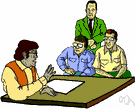 discourse — an extended communication (often interactive) dealing with some particular topic; «the book contains an excellent discussion of modal logic»; «his treatment of the race question is badly biased» discourse — an extended communication (often interactive) dealing with some particular topic; «the book contains an excellent discussion of modal logic»; «his treatment of the race question is badly biased»
discussion, treatment communicating, communication — the activity of communicating; the activity of conveying information; «they could not act without official communication from Moscow» detail — extended treatment of particulars; «the essay contained too much detail» dilation — a lengthy discussion (spoken or written) on a particular topic consideration — a discussion of a topic (as in a meeting); «consideration of the traffic problem took more than an hour» talk — discussion; (`talk about’ is a less formal alternative for `discussion of’); «his poetry contains much talk about love and anger» elaboration, enlargement, expansion — a discussion that provides additional information |
|
| Verb | 1. | discourse — to consider or examine in speech or writing; «The author talks about the different aspects of this question»; «The class discussed Dante’s `Inferno'»
discuss, talk about deal, plow, handle, treat, cover, address — act on verbally or in some form of artistic expression; «This book deals with incest»; «The course covered all of Western Civilization»; «The new book treats the history of China» descant — talk at great length about something of one’s interest talk shop — discuss matters that are related to work; «As soon as they met, the linguists started to talk shop» |
| 2. | discourse — carry on a conversation
converse argue, contend, debate, fence — have an argument about something interview, question — conduct an interview in television, newspaper, and radio reporting interview — discuss formally with (somebody) for the purpose of an evaluation; «We interviewed the job candidates» interview — go for an interview in the hope of being hired; «The job candidate interviewed everywhere» talk, speak — exchange thoughts; talk with; «We often talk business»; «Actions talk louder than words» chew the fat, chitchat, chit-chat, claver, confab, jaw, natter, shoot the breeze, chat, chaffer, confabulate, gossip, chatter, visit — talk socially without exchanging too much information; «the men were sitting in the cafe and shooting the breeze» |
|
| 3. | discourse — talk at length and formally about a topic; «The speaker dissertated about the social politics in 18th century England»
dissertate, hold forth talk, speak — exchange thoughts; talk with; «We often talk business»; «Actions talk louder than words» |
Based on WordNet 3.0, Farlex clipart collection. © 2003-2012 Princeton University, Farlex Inc.
discourse
noun
2. speech, talk, address, essay, lecture, sermon, treatise, dissertation, homily, oration, disquisition He responds with a lengthy discourse on deployment strategy.
Collins Thesaurus of the English Language – Complete and Unabridged 2nd Edition. 2002 © HarperCollins Publishers 1995, 2002
discourse
noun
1. The faculty, act, or product of speaking:
3. A formal, lengthy exposition of a topic:
verb
To engage in spoken exchange:
The American Heritage® Roget’s Thesaurus. Copyright © 2013, 2014 by Houghton Mifflin Harcourt Publishing Company. Published by Houghton Mifflin Harcourt Publishing Company. All rights reserved.


